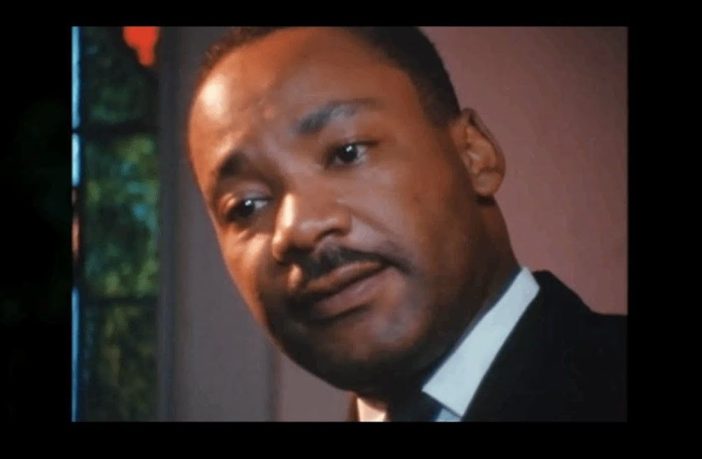I know MLK Day has come and gone, but we need to get a head start on MLK Day 2025, or we’ll end up regurgitating the same-o-same. And I don’t know about you, but I’m so tired of being beaten over the head every Martin Luther The King Day with non-stop dream-themed conferences, essay contests, speeches, etc.
It’s time we pump up other MLK quotes that deserve to become gold standards… especially since most of these come from the last three years of his life that saw MLK grow and expand in consciousness, understanding, and focus.
Hell, the fact that he said he thought his dream had become a nightmare (on May 8, 1967) should move us to hit pause on this country’s over-obsession with “the dream” this and “the dream” that, which has come to symbolize the rampant sterilizing, simplifying, marginalizing, and minimizing of MLK into some comfortable catchphrases that can be used by anybody to “endorse” their racist madness (yes, I’m talking to all you white nationalist politicians who need to keep MLK’s name out’chow gotdamn mouths).
Well, below I have compiled some MLK quotes that I believe should become even more well-known and revered as his parting “I Have a Dream” words. These quotes more accurately reveal the Black man MLK was at the time of his brutal murder at the hands of an overtly racist system.
SUGGESTED NEW MLK STANDARD QUOTES
“Whites, it must frankly be said, are not putting in a… mass effort to re-educate themselves out of their racial ignorance. It is an aspect of their sense of superiority that the white people of America believe they have so little to learn.” (“Where Do We Go From Here: Chaos or Community,” 1967 )
“If it may be said of the slavery era that the white man took the world and gave the Negro Jesus, then it may be said of the Reconstruction era that the southern aristocracy took the world and gave the poor white man Jim Crow.” (words from the conclusion of the march from Selma to Montgomery, March 25, 1965 )
“The world now demands a maturity of America that we may not be able to achieve.” (“Beyond Vietnam,” April 4, 1967 )
“The war in Vietnam is but a symptom of a far deeper malady within the American spirit, and if we ignore this sobering reality, we will find ourselves organizing ‘clergy and laymen concerned’ committees for the next generation. They will be concerned about Guatemala and Peru. They will be concerned about Thailand and Cambodia. They will be concerned about Mozambique and South Africa. We will be marching for these and a dozen other names and attending rallies without end unless there is a significant and profound change in American life and policy.” (“Beyond Vietnam,” April 4, 1967 )
“True compassion is more than flinging a coin to a beggar. It comes to see that an edifice which produces beggars needs restructuring.” (“Beyond Vietnam,” April 4, 1967 )
“Our only hope today lies in our ability to recapture the revolutionary spirit and go out into a sometimes hostile world declaring eternal hostility to poverty, racism, and militarism.” (“Beyond Vietnam,” April 4, 1967 )
“Freedom is never voluntarily given by the oppressor; it must be demanded by the oppressed.” (“Letter from Birmingham City Jail,” 1963 )
“We must be concerned not merely about who murdered them, but about the system, the way of life, the philosophy which produced the murderers.” (Eulogy for the Martyred Children, 1963 )
“Of all the forms of inequality, injustice in health is the most shocking and inhuman.” (speech at the Convention of the Medical Committee for Human Rights , 1966 )
“I must confess that that dream that I had that day has, in many points, turned into a nightmare. Now I’m not one to lose hope. I keep on hoping. I still have faith in the future. But I’ve had to analyze many things over the last few years and I would say over the last few months, I’ve gone through a lot of soul-searching and agonizing moments. And I’ve come to see that we have many more difficulties ahead and some of the old optimism was a little superficial and now it must be tempered with a solid realism. And I think the realistic fact is that we still have a long, long way to go.” (Interview with NBC, May 8, 1967 )
The solution to poverty is to abolish it directly by a now widely discussed matter: the guaranteed income… The curse of poverty has no justification in our age. It is socially as cruel and blind as the practice of cannibalism at the dawn of civilization, when men ate each other because they had not yet learned to take food from the soil or to consume the abundant animal life around them. The time has come for us to civilize ourselves by the total, direct and immediate abolition of poverty. (“Where Do We Go From Here: Chaos or Community,” 1967 )
“We’ve been in the mountain of war. We’ve been in the mountain of violence. We’ve been in the mountain of hatred long enough. It is necessary to move on now, but only by moving out of this mountain can we move to the promised land of justice and brotherhood and the Kingdom of God. It all boils down to the fact that we must never allow ourselves to become satisfied with unattained goals. We must always maintain a kind of divine discontent.” (Nobel Peace Prize acceptance speech, Dec. 10, 1964 )
“Every step towards the goal of justice requires sacrifice, suffering, and struggle; the tireless exertions and passionate concern of dedicated individuals. Without persistent effort, time itself becomes an ally of the insurgent and primitive forces of irrational emotionalism and social destruction.” (“Where Do We Go From Here: Chaos of Community,” 1967 )
“I have almost reached the regrettable conclusion that the Negro’s great stumbling block in his stride toward freedom is not the White Citizen’s Counciler or the Ku Klux Klanner, but the white moderate, who is more devoted to ‘order’ than to justice; who prefers a negative peace which is the absence of tension to a positive peace which is the presence of justice; who constantly says: ‘I agree with you in the goal you seek, but I cannot agree with your methods of direct action’; who paternalistically believes he can set the timetable for another man’s freedom; who lives by a mythical concept of time and who constantly advises the Negro to wait for a ‘more convenient season.’ Shallow understanding from people of good will is more frustrating than absolute misunderstanding from people of ill will. Lukewarm acceptance is much more bewildering than outright rejection. (“Letter from a Birmingham Jail,” 1963 )
I have the audacity to believe that peoples everywhere can have three meals a day for their bodies, education and culture for their minds, and dignity, equality and freedom for their spirits. (Nobel Peace Prize acceptance speech, 1964 )



